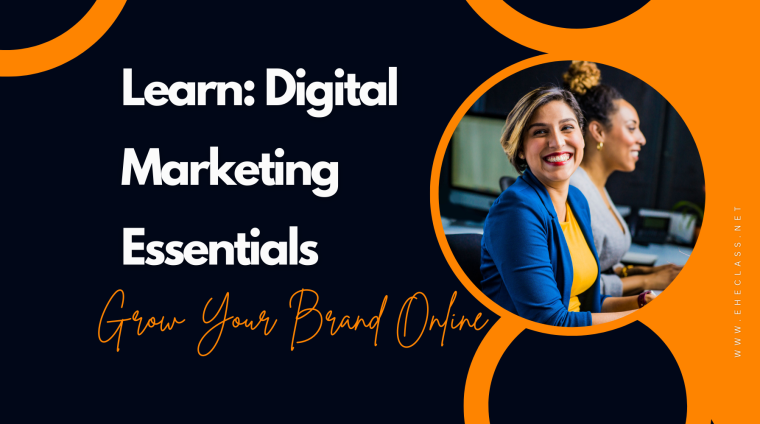DIGITAL MARKETING MASTERY: SKYROCKET YOUR BRAND ONLINE
DIGITAL MARKETING MASTERY: SKYROCKET YOUR BRAND ONLINE
Table of Contents
- Introduction to Digital Branding
- Fundamentals of Digital Marketing
- Building a Strong Brand Identity
- Crafting a Digital Marketing Strategy
- Search Engine Optimization (SEO) for Brand Visibility
- Content Marketing: Engaging Your Audience
- Social Media Marketing: Amplifying Your Brand
- Email Marketing: Nurturing Customer Relationships
- Pay-Per-Click (PPC) Advertising: Driving Conversions
- Analytics and Performance Tracking
- Emerging Trends in Digital Marketing
- Practical Applications: Building Your Brand
- Scaling Your Brand for Growth
- Tools and Resources for Digital Branding
1. Introduction to Digital Branding
This section sets the foundation for the course by introducing learners to the digital landscape. It explores why branding is crucial in the digital age, where consumers are bombarded with information across multiple platforms. The course objectives are outlined, emphasizing practical skills like increasing online visibility, fostering audience engagement, and driving conversions. Learners will understand the scope of digital branding and how it integrates with marketing strategies to create a lasting impact.
In today’s hyper-connected world, digital marketing is the cornerstone of building a successful brand. With billions of people online, businesses have unprecedented opportunities to reach audiences, engage customers, and drive growth. However, navigating the digital landscape requires a strategic approach. This article explores the essentials of digital marketing, offering actionable insights to help brands thrive online.
Digital marketing encompasses all online strategies and tactics used to promote products or services. Unlike traditional marketing, it leverages digital channels such as search engines, social media, email, and websites to connect with audiences. Its advantages include precise targeting, measurable results, and cost-effectiveness, making it accessible for businesses of all sizes. The core goal is to build brand awareness, foster customer loyalty, and drive conversions.
Digital marketing isn’t without hurdles. High competition, algorithm changes, and ad fatigue can hinder results. To stay ahead, keep up with trends like AI-driven advertising or voice search optimization. Test campaigns regularly, using A/B testing to identify what resonates. Invest in learning—free resources like HubSpot Academy or Google Skillshop offer valuable insights.
Emerging technologies like artificial intelligence, augmented reality, and video content are shaping digital marketing’s future. AI tools can analyze consumer behavior, personalizing ads in real-time. Video content, especially short-form, continues to dominate, with platforms like YouTube and TikTok driving engagement. Staying adaptable and experimenting with new tools ensures long-term success.
Digital marketing is a dynamic, essential tool for growing your brand online. By mastering SEO, content, social media, email, and PPC, businesses can connect with audiences effectively. A well-defined strategy, rooted in audience understanding and data-driven decisions, unlocks immense potential. Start small, track results, and scale efforts to build a thriving online presence.
2. Fundamentals of Digital Marketing
This module introduces digital marketing as the backbone of brand building. Learners will explore its core components, including SEO, content marketing, social media marketing, email marketing, and PPC advertising. The section emphasizes aligning marketing efforts with brand goals to ensure consistency and effectiveness.
3. Building a Strong Brand Identity
A strong brand identity is the cornerstone of digital success. This section guides learners through defining their brand’s mission, vision, and values, and creating a Unique Value Proposition (UVP). It covers designing visual elements like logos and choosing a consistent brand voice to resonate with the target audience.
4. Crafting a Digital Marketing Strategy
A well-defined digital marketing strategy is essential for brand growth. This section teaches learners to set SMART (Specific, Measurable, Achievable, Relevant, Time-bound) goals, identify their target audience through buyer personas, and select appropriate digital channels. It also covers developing a content strategy to align with brand objectives.
5. Search Engine Optimization (SEO) for Brand Visibility
SEO is critical for improving online visibility. This module covers the basics of SEO, including keyword research, on-page and off-page optimization, and technical SEO. Learners will explore tools like Google Keyword Planner and analytics platforms to measure SEO performance.
6. Content Marketing: Engaging Your Audience
Content marketing is about creating valuable, relevant content to attract and retain an audience. This section explores different content formats (e.g., blogs, videos, infographics) and strategies for distribution. Learners will gain hands-on experience using tools like Canva and WordPress.
7. Social Media Marketing: Amplifying Your Brand
Social media marketing is a powerful tool for brand amplification. This module covers major platforms (e.g., Instagram, LinkedIn, TikTok) and strategies for building a social media presence. Learners will explore organic and paid social media tactics and analyze engagement metrics.
8. Email Marketing: Nurturing Customer Relationships
Email marketing remains a cost-effective way to build customer relationships. This section teaches learners to create segmented email lists, design compelling campaigns, and use automation tools like Mailchimp. It also covers analyzing open rates and click-through rates.
9. Pay-Per-Click (PPC) Advertising: Driving Conversions
PPC advertising helps brands achieve immediate visibility and conversions. This module focuses on setting up Google Ads campaigns, choosing targeting options, and crafting compelling ad copy. Learners will learn to optimize campaigns for maximum ROI.
10. Analytics and Performance Tracking
Data-driven decision-making is at the heart of digital marketing. This section introduces analytics tools like Google Analytics and SEMrush, teaching learners to track Key Performance Indicators (KPIs) and interpret data to refine strategies.
11. Emerging Trends in Digital Marketing
The digital landscape is constantly evolving. This module explores emerging trends like AI-driven marketing, voice search optimization, influencer marketing, and video marketing. Learners will understand how to stay ahead of the curve.
12. Practical Applications: Building Your Brand
This hands-on section allows learners to apply their knowledge through projects and case studies. Participants will create a digital marketing plan, develop a brand campaign, and receive peer feedback to refine their work.
13. Scaling Your Brand for Growth
Once a brand is established, scaling is the next step. This section covers expanding digital presence, leveraging partnerships, and adapting to market changes. It emphasizes strategies for sustaining long-term brand loyalty.
14. Tools and Resources for Digital Branding
This module introduces essential tools for digital marketing, such as Canva for design, Hootsuite for social media management, and HubSpot for CRM. Learners will compare free and paid tools and explore industry resources to stay updated.
15. Conclusion and Next Steps
The course concludes with a recap of key learnings and guidance on next steps. Learners will explore career opportunities in digital marketing, recommended certifications (e.g., Google Ads, HubSpot), and strategies for applying their skills to personal or business branding.
- 10 Sections
- 62 Lessons
- 10 Weeks
- 1. Introduction to Digital MarketingThe first module of this course, "Introduction to Digital Marketing," lays the foundation for understanding the modern marketing landscape and how it has transformed in the digital era. This module is designed to provide a comprehensive overview of digital marketing, its key components, and how it differs from traditional marketing methods. What You Will Learn: Definition and Importance of Digital Marketing: Explore what digital marketing is and why it has become a critical strategy for businesses in the 21st century. Traditional vs. Digital Marketing: Understand the evolution of marketing, comparing the traditional approaches with dynamic digital strategies that offer greater reach and measurability. Overview of Digital Marketing Channels: Get acquainted with the primary channels of digital marketing, including search engines, social media, content marketing, email marketing, and pay-per-click advertising. Real-World Examples and Case Studies: Learn how businesses of all sizes use digital marketing to achieve their goals, build their brands, and connect with audiences worldwide. Why This Module is Important: This introductory module sets the stage for more advanced topics by helping learners build a solid understanding of the digital marketing framework. It highlights how digital marketing aligns with consumer behavior trends and leverages data and technology to create targeted, impactful campaigns. By the end of this module, you will have a clear grasp of the scope and potential of digital marketing and be ready to start developing a strategy that aligns with your goals. Through engaging activities and practical examples, this module ensures you are prepared to dive deeper into the specialized aspects of digital marketing in subsequent modules.7
- 1.11-1 Understand the digital marketing landscape.
- 1.21-2 Identify the benefits and key components of digital marketing.
- 1.31-3 What is Digital Marketing?
- 1.41-4 Traditional Marketing vs. Digital Marketing
- 1.51-5 Overview of Digital Marketing Channels
- 1.61-6 Case studies of successful digital marketing campaigns.
- 1.71-7 Digital marketing knowledge quiz.
- 2. Creating a Digital Marketing StrategyIn Module 2, "Creating a Digital Marketing Strategy," you will learn how to build a roadmap for achieving your marketing objectives. A well-defined strategy is the cornerstone of successful digital marketing, ensuring that your efforts are focused, measurable, and aligned with your brand’s goals. What You Will Learn: Setting SMART Goals: Understand how to define Specific, Measurable, Achievable, Relevant, and Time-bound (SMART) objectives that guide your digital marketing campaigns. Identifying Your Target Audience: Learn to research and analyze your audience to create detailed buyer personas that reflect their needs, preferences, and online behavior. Building a Marketing Funnel: Explore the concept of marketing funnels, from attracting potential customers at the awareness stage to converting them into loyal advocates at the decision and retention stages. Integrating Channels and Platforms: Discover how to select and combine the right digital channels—such as social media, email, SEO, and paid advertising—into a cohesive strategy tailored to your goals. Why This Module is Important: Without a strategic framework, digital marketing efforts can become scattered and ineffective. This module teaches you how to create a clear, actionable plan that prioritizes the right activities and allocates resources efficiently. By understanding your target audience and setting realistic goals, you’ll be equipped to design campaigns that deliver meaningful results. Activities and Outcomes: By the end of this module, you will develop a preliminary digital marketing strategy for your brand or business. Through interactive workshops and exercises, you will practice building buyer personas, defining objectives, and outlining a marketing funnel, laying the groundwork for successful campaigns in future modules.7
- 2.12-1 Develop a goal-oriented marketing strategy.10 Minutes0 Questions
- 2.22-2 Define target audiences and create buyer personas.10 Minutes0 Questions
- 2.32-3 Setting SMART Goals10 Minutes0 Questions
- 2.42-4 Identifying Your Target Audience10 Minutes0 Questions
- 2.52-5 Building a Marketing Funnel10 Minutes0 Questions
- 2.62-6 Creating a digital marketing strategy for your brand.10 Minutes0 Questions
- 2.72-7 Persona development exercise.10 Minutes0 Questions
- 3. Website Optimization and User Experience (UX)Module 3, "Website Optimization and User Experience (UX)," focuses on ensuring that your website functions as an effective hub for your digital marketing efforts. A well-optimized website with an excellent user experience is crucial for engaging visitors, driving conversions, and improving search engine rankings. What You Will Learn: Understanding Website Analytics: Learn to analyze website performance using tools like Google Analytics. Identify key metrics such as bounce rates, session durations, and conversion rates to evaluate user behavior. Mobile Responsiveness and Page Speed: Discover the importance of a mobile-friendly design and fast page load times. Understand how these factors influence both user experience and SEO rankings. Principles of User Experience (UX) Design: Explore the elements that contribute to a positive user experience, such as intuitive navigation, visually appealing layouts, and clear calls-to-action (CTAs). Learn how to prioritize accessibility to cater to diverse users. SEO and Content Alignment: Understand how to align your website’s content with SEO best practices to improve visibility while delivering value to users. Why This Module is Important: A website often serves as the first point of contact between a brand and its audience. A poorly designed or slow website can lead to lost opportunities, no matter how strong your marketing campaigns are. This module emphasizes the importance of creating a seamless, user-friendly online experience that keeps visitors engaged and encourages them to take action. Activities and Outcomes: By the end of this module, you will be able to conduct a comprehensive website audit and implement changes to improve performance and user satisfaction. Through hands-on exercises, such as optimizing page layouts and reviewing analytics reports, you’ll gain the skills needed to create a website that supports your marketing goals effectively.7
- 3.13.1 Enhance website performance for better engagement and SEO.
- 3.23.2 Understand the principles of user-friendly design.
- 3.33.3 Basics of Website Analytics
- 3.43.4 Mobile Responsiveness and Page Speed
- 3.53.5 Designing for User Experience (UX) and Accessibility
- 3.63.6 Website audit using Google Analytics and other tools.
- 3.73.7 Peer reviews of website designs.
- 4. Search Engine Optimization (SEO)In Module 4, "Search Engine Optimization (SEO)," you will dive into the techniques and strategies that enhance your website's visibility on search engines. SEO is a cornerstone of digital marketing, ensuring that your brand reaches the right audience organically. What You Will Learn: Introduction to SEO Fundamentals: Gain a clear understanding of how search engines work and the factors that influence website rankings. Learn about Google’s algorithms and how they impact search results. Keyword Research and Targeting: Explore tools and methods to identify relevant keywords your target audience is searching for. Learn how to prioritize and strategically use these keywords in your content. On-Page SEO Techniques: Understand the critical elements of on-page optimization, including title tags, meta descriptions, header tags, and internal linking structures. Off-Page SEO Strategies: Discover how backlinks, guest blogging, and social sharing contribute to building your website’s authority and improving its ranking. Technical SEO Essentials: Learn about website architecture, mobile optimization, page speed, and other technical aspects that affect your SEO performance. Why This Module is Important: SEO is a cost-effective way to drive consistent and high-quality traffic to your website. This module equips you with the tools and knowledge to improve your site’s discoverability, attract potential customers, and gain a competitive edge in the crowded digital space. Activities and Outcomes: By the end of this module, you will have the skills to perform a full SEO audit of your website and develop a keyword-driven content strategy. Practical exercises will include using tools like Google Search Console and SEMrush to analyze performance, track progress, and refine your SEO efforts for long-term success. This hands-on approach ensures you can apply your learning directly to your digital marketing initiatives.7
- 5. Content MarketingModule 5, "Content Marketing," delves into the art and science of creating and distributing valuable content to attract, engage, and retain your target audience. Content marketing is a vital component of any digital strategy, helping businesses build trust, showcase expertise, and drive conversions. What You Will Learn: The Role of Content in Digital Marketing: Understand how high-quality content aligns with your audience’s needs and supports overall marketing objectives. Developing a Content Plan: Learn to create a comprehensive content strategy that identifies key topics, formats, and channels based on your goals and audience preferences. Types of Content and Formats: Explore various content types, including blogs, videos, infographics, podcasts, and case studies. Discover when and where to use each format for maximum impact. Content Distribution Strategies: Understand how to amplify the reach of your content through social media, email marketing, and collaboration with influencers. Measuring Content Success: Learn how to track the performance of your content using analytics tools. Identify metrics such as engagement, traffic, and lead generation to assess ROI and refine your strategy. Why This Module is Important: In a digital-first world, content is a powerful tool to connect with audiences, convey your brand’s message, and guide users through the buyer’s journey. This module equips you with the skills to produce compelling content that not only resonates with your audience but also drives measurable results. Activities and Outcomes: By the end of this module, you will have created a detailed content calendar for your brand, complete with topics, formats, and distribution plans. Hands-on activities, such as writing blog posts and brainstorming video ideas, will prepare you to execute a content marketing strategy that strengthens your brand’s online presence and builds long-term relationships with your audience.7
- 5.15.1 Create engaging and valuable content for your audience.
- 5.25.2 Utilize various formats and platforms for content distribution.
- 5.35.3 Developing a Content Plan
- 5.45.4 Blogging, Video Marketing, and Infographics
- 5.55.5 Content Distribution Strategies
- 5.65.6 Blog writing workshop.
- 5.75.7 Content calendar creation.
- 6. Social Media MarketingModule 6, "Social Media Marketing," explores how businesses can harness the power of social media platforms to connect with audiences, build brand awareness, and drive engagement. Social media has become a cornerstone of digital marketing, offering diverse opportunities for both organic and paid promotions. What You Will Learn: Introduction to Social Media Platforms: Gain an understanding of the most popular platforms, including Facebook, Instagram, Twitter, LinkedIn, TikTok, and Pinterest. Learn the unique strengths of each and their suitability for different audiences. Crafting a Social Media Strategy: Discover how to set goals, choose the right platforms, and develop content tailored to each platform’s audience and features. Content Creation and Engagement: Learn how to create visually appealing, shareable, and meaningful content that captures attention. Understand the importance of engaging with your audience through comments, messages, and interactive features like polls and live sessions. Social Media Advertising: Get an introduction to paid social media campaigns. Learn about ad formats, targeting options, and budgeting strategies to maximize ROI. Analytics and Optimization: Use social media analytics tools to monitor performance, track key metrics, and adjust your strategy for continuous improvement. Why This Module is Important: With billions of active users worldwide, social media is a powerful channel for building relationships and driving brand growth. This module teaches you how to create impactful campaigns that resonate with your audience and achieve measurable results. Activities and Outcomes: By the end of this module, you will have developed a social media marketing plan, including organic content strategies and paid advertising concepts. Hands-on exercises, such as designing posts and setting up ad campaigns, will prepare you to execute and manage effective social media efforts that amplify your brand’s online presence and drive business growth.7
- 6.16.1 Leverage social media platforms to build and engage audiences.
- 6.26.2 Develop paid and organic social media campaigns.
- 6.36.3 Overview of Popular Social Media Platforms
- 6.46.4 Crafting Social Media Strategies
- 6.56.5 Introduction to Paid Advertising on Social Media
- 6.66.6 Social media campaign simulation.
- 6.76.7 Analyze case studies of viral social campaigns.
- 7. Email MarketingModule 7, "Email Marketing," focuses on one of the most reliable and cost-effective digital marketing channels. Email marketing allows businesses to build relationships with their audience, nurture leads, and drive conversions by delivering personalized, targeted messages directly to inboxes. What You Will Learn: The Basics of Email Marketing: Understand the fundamentals of email marketing, including its purpose, benefits, and role in the broader digital marketing strategy. Building and Growing an Email List: Learn how to ethically collect email addresses and expand your list using lead magnets, sign-up forms, and other opt-in strategies. Crafting Effective Emails: Discover the components of a compelling email, from subject lines and copywriting to visual elements and call-to-action (CTA) buttons. Email Automation and Campaigns: Explore automation tools and workflows to set up welcome sequences, drip campaigns, and re-engagement strategies that save time and maximize impact. Analyzing Email Performance: Learn to track and measure key metrics such as open rates, click-through rates, and conversion rates to evaluate the success of your campaigns and optimize for better results. Why This Module is Important: Email marketing remains a cornerstone of digital marketing because of its direct and personalized approach. It offers unparalleled ROI and allows businesses to maintain consistent communication with their audience. This module provides you with the knowledge and tools to design and execute impactful email campaigns. Activities and Outcomes: By the end of this module, you will have created a complete email marketing campaign, including a lead capture form, email sequence, and performance tracking plan. Hands-on exercises, such as crafting email templates and running A/B tests, will ensure you’re equipped to implement email strategies that drive meaningful engagement and measurable results.7
- 7.17.1 Design effective email marketing campaigns.
- 7.27.2 Measure email marketing performance metrics.
- 7.37.3 Building an Email List
- 7.47.4 Writing Effective Email Content
- 7.57.5 Automation and A/B Testing
- 7.67.6 Create and test email marketing campaigns.
- 7.77.7 Analyze email open and click-through rates.
- 8. Digital Advertising (PPC and Display Ads)Module 8, "Digital Advertising (PPC and Display Ads)," equips you with the skills to create, manage, and optimize paid advertising campaigns that drive targeted traffic and achieve measurable results. Paid ads are a powerful way to boost visibility, increase conversions, and accelerate your digital marketing efforts. What You Will Learn: Introduction to Digital Advertising: Understand the basics of pay-per-click (PPC) advertising, display ads, and their role in a comprehensive digital marketing strategy. Setting Up PPC Campaigns: Learn how to create and manage PPC campaigns using platforms like Google Ads. Discover how to perform keyword research, bid strategically, and design ad copy that converts. Display Advertising Basics: Explore the world of display ads, including banner ads and video ads. Understand how to design eye-catching visuals and target them effectively using the Google Display Network and similar platforms. Retargeting and Remarketing Strategies: Learn how to re-engage visitors who have previously interacted with your brand by using retargeting campaigns that encourage them to return and take action. Measuring Campaign Success: Gain insights into tracking and optimizing campaign performance. Learn about key metrics like click-through rates (CTR), cost-per-click (CPC), and conversion rates. Why This Module is Important: Digital advertising offers businesses an opportunity to reach their ideal audience quickly and effectively. By mastering PPC and display advertising, you can drive immediate traffic, test marketing messages, and achieve precise targeting that organic methods may not always provide. Activities and Outcomes: By the end of this module, you will have the skills to set up a PPC campaign, design a display ad, and analyze performance metrics. Practical exercises, such as crafting ad copy and optimizing bids, will prepare you to execute paid advertising strategies that complement your overall digital marketing plan and deliver impactful results.7
- 8.18.1 Set up and optimize pay-per-click (PPC) campaigns.
- 8.28.2 Understand the basics of display and video advertising.
- 8.38.3 Google Ads and Keyword Bidding
- 8.48.4 Retargeting Strategies
- 8.58.5 Measuring Campaign Performance
- 8.68.6 Practice setting up a PPC campaign.
- 8.78.7 Analyze an ad performance report.
- 9. Analytics and Measuring SuccessModule 9, "Analytics and Measuring Success," teaches you how to track, measure, and interpret data to understand the performance of your digital marketing campaigns. Data-driven insights are crucial for refining strategies and achieving marketing objectives effectively. What You Will Learn: Introduction to Digital Analytics: Understand the role of analytics in digital marketing and why it is essential for measuring campaign performance and ROI. Key Metrics and KPIs: Learn about critical metrics like traffic, bounce rate, conversion rate, and customer lifetime value (CLV). Understand how to align key performance indicators (KPIs) with your business goals. Using Analytics Tools: Gain hands-on experience with tools like Google Analytics, Google Tag Manager, and other platforms to collect and analyze data. Conversion Tracking: Learn how to set up conversion tracking to measure user actions, such as purchases, form submissions, and downloads. Data Visualization and Reporting: Discover how to create clear, actionable reports that communicate insights to stakeholders. Use dashboards and visualizations to track progress and identify trends. Refining Strategies: Explore how to use analytics to adjust campaigns, optimize performance, and predict future outcomes. Why This Module is Important: Analytics enables marketers to make informed decisions, maximize resources, and continuously improve their efforts. Without data, it’s impossible to know what’s working, what’s not, and how to optimize for better results. Activities and Outcomes: By the end of this module, you will have the skills to interpret analytics data, create performance reports, and refine digital marketing strategies. Practical activities include setting up tracking codes, analyzing real campaign data, and building dashboards, ensuring you’re equipped to measure success and drive results in your marketing efforts.6
- 10. Advanced Digital Marketing TrendsModule 10, "Advanced Digital Marketing Trends," explores cutting-edge tools, techniques, and strategies that are shaping the future of digital marketing. Staying ahead of trends is crucial for maintaining a competitive edge in today’s rapidly evolving digital landscape. What You Will Learn: Emerging Technologies in Marketing: Dive into the role of artificial intelligence (AI), machine learning, and automation in creating personalized marketing experiences. Learn how tools like chatbots, recommendation engines, and predictive analytics can enhance engagement and efficiency. Voice Search and Conversational Marketing: Understand how the rise of voice-activated devices and virtual assistants like Alexa and Siri are transforming search behavior. Explore strategies to optimize for voice search and implement conversational marketing. Video Marketing Evolution: Discover the increasing impact of short-form videos, live streaming, and interactive video content in engaging audiences. Learn how to create compelling video campaigns that resonate with users. Sustainability and Ethical Marketing: Explore how consumer demand for transparency and social responsibility is driving brands to adopt sustainable and ethical marketing practices. Trends in Social Media and Influencer Marketing: Stay updated on new features, platform-specific opportunities, and the rise of micro-influencers in building authentic connections with audiences. Why This Module is Important: The digital marketing landscape is constantly evolving. By understanding and adapting to advanced trends, businesses can anticipate shifts in consumer behavior and leverage new technologies to stay relevant and innovative. Activities and Outcomes: By the end of this module, you will have the ability to identify emerging trends and integrate them into your marketing strategy. Activities include evaluating the potential of AI tools, designing a voice-search-friendly content strategy, and brainstorming sustainable marketing practices. This forward-thinking approach will prepare you to lead in the ever-changing digital marketing world.7
- 10.110.1 Stay ahead with emerging digital marketing trends.
- 10.210.2 Leverage AI, chatbots, and personalization in marketing.
- 10.310.3 AI in Digital Marketing
- 10.410.4 Voice Search and Virtual Assistants
- 10.510.5 Ethical Considerations in Digital Marketing
- 10.610.6 Group discussion on the future of digital marketing.
- 10.710.7 Trend forecasting activity.

Courses you might be interested in
-
EHECLASS
-
16 Lessons
-
EHECLASS
-
10 Lessons
-
EHECLASS
-
16 Lessons
-
EHECLASS
-
26 Lessons





